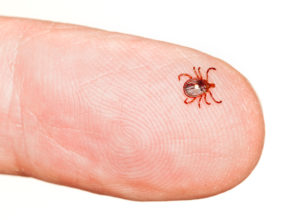Here in South Florida, we enjoy warm weather year-round. We have the luxury of taking our dogs out with us to enjoy the Florida sunshine throughout the year. Ticks love warm weather too. The tick-borne disease, Ehrlichiosis, is found in dogs more frequently than you might think. In fact, there are some veterinarians who think their canine patients should be checked yearly for the disease just like they are checked for heartworm.
What is Ehrlichiosis in Dogs?
Ehrlichiosis is a bacterial infection that is caused by a tick bite. The rickettsial organism is responsible for this tick-borne disease. There are two types of Ehrlichiosis in dogs: Canine Granulocytic Ehrlichiosis and Canine Monocytic Ehrlichiosis.
How Can My Dog Get Ehrlichiosis?
Ehrlichiosis is transmitted when a dog is bitten by an infected tick. According to the Centers for Disease Control, the lone star tick is the most common tick to carry Canine Granulocytic Ehrlichiosis. The brown dog tick is the most common transmitter of Canine Monocytic Ehrlichiosis. As the name implies, the brown dog tick feeds mainly off dogs and is, therefore, most commonly found in areas where dogs frequent, such as dog parks.
What Are the Symptoms of Ehrlichiosis In Dogs?
Dogs infected with Ehrlichiosis may show symptoms such as swollen lymph nodes, fever, weight loss, lethargy, lack of appetite, diarrhea, vomiting, lameness, chronic eye inflammation, fever, respiratory distress and bleeding conditions, depending on the type. Occasionally there are signs of neurological disorders. When dogs are exhibiting these symptoms, they are at the chronic stage, having had the infection for some time.
Dogs in the early stages of the disease do not normally show any signs. One of the ways the disease may be diagnosed early is if blood is taken and shows a low platelet count. Some dogs that are exposed, never show any signs of the disease.
How Can I Prevent Ehrlichiosis In My Dog?
There is no vaccine for the prevention of Ehrlichiosis, so the best way to prevent the disease is to protect your dog from tick bites. Talk to your veterinarian about the best tick prevention for your dog.
What Happens If My Dog Is Diagnosed?
The most common treatment is the antibiotic doxycycline.
If your dog is experiencing a bleeding disorder, a blood transfusion may be necessary.
Once your dog receives treatment the prognosis for a complete recovery is good and you should see improvements within the first day or two.
Can I Get It?
Yes, but only from a tick bite. You cannot get it from your dog as the disease is only transmitted through tick bites.
Ehrlichiosis is a very serious disease and it is wise to check your dog regularly for ticks. Please make sure you know the correct method for removing ticks as doing this incorrectly can cause the tick head to break off and cause infection or cause the tick to excrete more saliva increasing your dog’s chances of becoming ill.
If you enjoyed this article please share.


